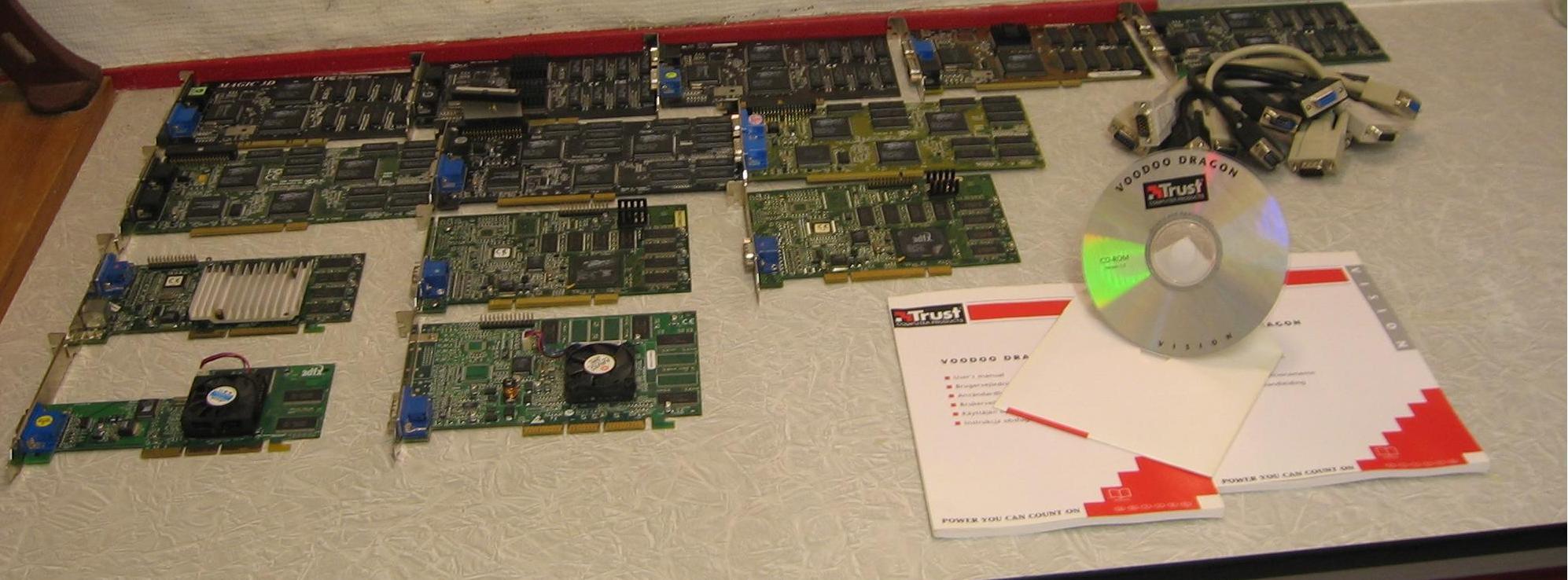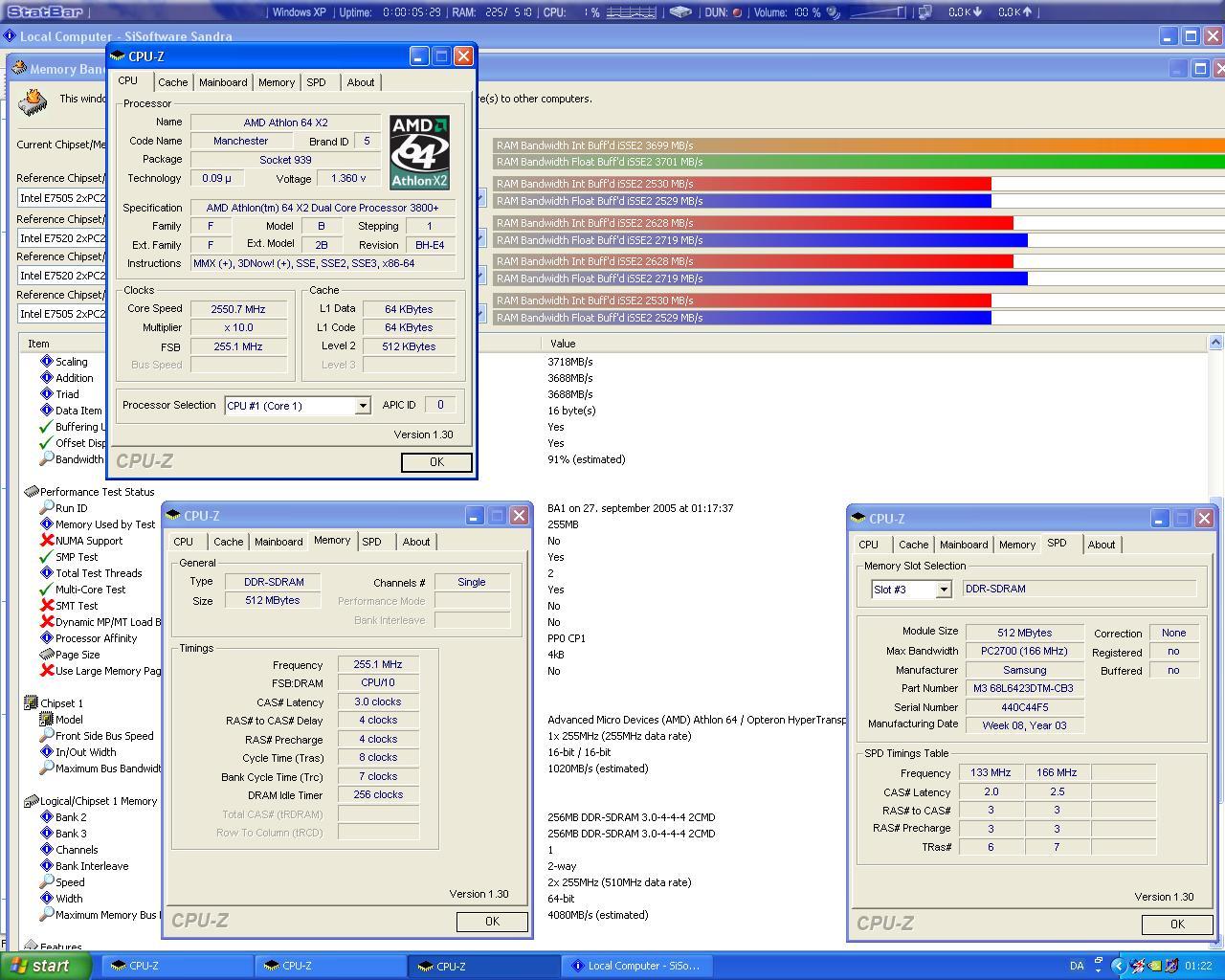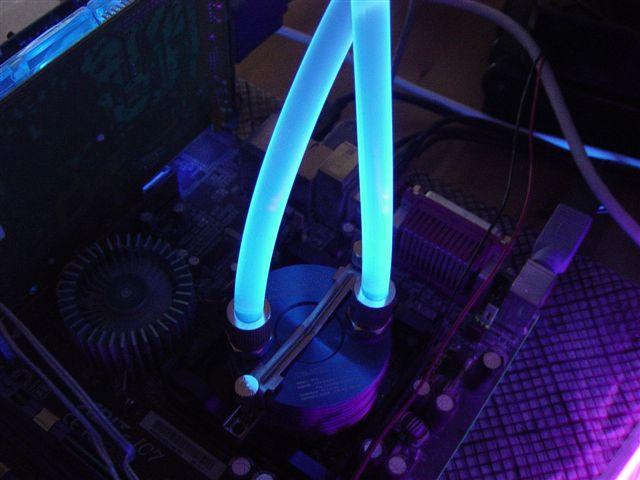Test: AMD Athlon 64 X2 4800+
CPU, AMD d. 11. maj. 2005, skrevet af System 12 Kommentarer. Vist: 28117 gange.
Korrekturlæser:
Billed behandling:
Oversættelse:
Pristjek på http://www.pricerunner.dk 0,00
Produkt udlånt af: Sd-Data A/S
DK distributør: Sd-Data A/S
Billed behandling:
Oversættelse:
Pristjek på http://www.pricerunner.dk 0,00
Produkt udlånt af: Sd-Data A/S
DK distributør: Sd-Data A/S
#1
Når en forfatter skriver en så velskrevet artikel, med lige tilpas nørdet humor og forklarende teori, så bliver man jo målløs! Er absollut imponeret over standarden, og så må de andre forfattere (og self også resten af OC/HT-crewet som i forvejen gør en fantastisk indsats) prøve at følge med!
Nåja, hvad er dette for en bummer på sidste side, skam dig!:
"...at have eje en dualcore processor..."
Nåja, hvad er dette for en bummer på sidste side, skam dig!:
"...at have eje en dualcore processor..."
#2
*bukker og nejer*, jeg kan jo næsten ikke andet end sende en tak i din retning #1, men det er også delvis Klavs S\', Lockheeds og NoNigs fortjeneste :)
Bummeren vil jeg så have lov til at skubbe over på Lockheed, der læser korrektur og NoNig der oversatte min konklusion - jeg har ikke købt min teflon-skjorte af AMD Engineer for sjov ;)
Have eje skulle hermed være ændret til eje.
Bummeren vil jeg så have lov til at skubbe over på Lockheed, der læser korrektur og NoNig der oversatte min konklusion - jeg har ikke købt min teflon-skjorte af AMD Engineer for sjov ;)
Have eje skulle hermed være ændret til eje.
#3
Rigtigt velskrevet og tilpas irriterende lokkende :( Jeg MÅ have sådan en, nu :D
Kigger vi på prisen er den måske ikke så høj igen - tænk på at i faktisk får 2 CPUer i een, så de små 4000 kr. for en X2 4200 virker for mig ikke som det vildeste :)
Kigger vi på prisen er den måske ikke så høj igen - tænk på at i faktisk får 2 CPUer i een, så de små 4000 kr. for en X2 4200 virker for mig ikke som det vildeste :)
#4
fin test :), skal bare ha en Dualcore sådan er det bare, og med hensyn til intels HT så kan de godt spare sig :P følelsen bliver ikke mere ægte en Dualcore, har prøvet Ht det sutter *host* min personlige mening self...
#5
#3 det er stadig meget at give, da man ikke mærker det HELT vilde ryk i langt de fleste tilfælde, men igen er der de små ting som f.eks. alt-tabbe mens man spiller eller IE der lige åbner et sekund hurtigere mens man åbner photoshop eller lign.
#4 At sige HT sutter er en stor fejl - og det er sagt som AMD mand ;)
#4 At sige HT sutter er en stor fejl - og det er sagt som AMD mand ;)
#5 flot artikkel woddy.... :p
MEN.... prøv at læg mærke til jeres billede af windows egenskaber.. hov hva... har i ikke lige glemt at strege produkt koden ud i paint eller et andet billeds redigerings program... syntes i sku få det ordnet ... bare for go ordens skyld... ;)
MEN.... prøv at læg mærke til jeres billede af windows egenskaber.. hov hva... har i ikke lige glemt at strege produkt koden ud i paint eller et andet billeds redigerings program... syntes i sku få det ordnet ... bare for go ordens skyld... ;)
#7
Weeeee en AMD med 64 bit tech. og som multitasker bedre end hyperthread intel..
Hvad bliver det næste ikke?? hunde går på 2 ben og lyserøde elefanter? :e
Må eje sådan en..
AFK.. er i banken.
Hvad bliver det næste ikke?? hunde går på 2 ben og lyserøde elefanter? :e
Må eje sådan en..
AFK.. er i banken.
#8
Smadderflot artikel, Nibedreng :) Bare lidt synd, at du sådan udleverer Nonig :P ("..og NoNig der oversatte min konklusion..")
"Users that runs heavy programs.."
Hvad med "Users WHO RUN heavy programs.."? :P
"..it's something one have to see for him/herself"
Hvad med "it's something one HAS to see for him/herself"? :P
"Were it not for the high price the Athlon 64 X2 4800+.."
Hvad med "WAS it not for the high price of the Athlon 64 X2 4800+"? :P
.. den var satme ikke sjov, Allan Meinke ;)
"Users that runs heavy programs.."
Hvad med "Users WHO RUN heavy programs.."? :P
"..it's something one have to see for him/herself"
Hvad med "it's something one HAS to see for him/herself"? :P
"Were it not for the high price the Athlon 64 X2 4800+.."
Hvad med "WAS it not for the high price of the Athlon 64 X2 4800+"? :P
.. den var satme ikke sjov, Allan Meinke ;)
#9
#7 du skal da have dual dualcore Opteron på et PCI-E mobo og 4GB RAM (2GB til hver CPU - selvfølgelig :) )
#8 jeg takker da og så må jeg lige se på det kæmpe læs tyrkfejl, som NoNig har rodet sig ud i, når jeg får lidt tid :)
#8 jeg takker da og så må jeg lige se på det kæmpe læs tyrkfejl, som NoNig har rodet sig ud i, når jeg får lidt tid :)
#10
Okææ... det lyder jo godt altsammen, men lige et dumt spørgsmål :
Øger AMD's dualcore teknologi ydelsen på alle mine programmer..??
Skal programmerne være skrevet til at udnytte dualcore og hvis det er tilfældet hvor mange programmer kan så det...???
Sidst jeg havde fat i en dual processor var i de gode gamle Celeron 366 -dage hvor man kunne få to processorer for 800,- og klokke dem op til en hastighed som endnu ikke var set. Det var såddan set fint nok, men om jeg havde en eller to processorer i mit A-bit bræt kunne jeg ikke rigtigt få øje på så længe jeg brugte Win2kproff.
Det endte med at den blev brugt til server (win2kserver) da server operativsystemet bedre kunne udnytte dualprocessing.
Kan windows xp finde ud af at bruge 2 processorer, eller er programmerne generelt lavet til dualprocessor, eller hvad..??
Øger AMD's dualcore teknologi ydelsen på alle mine programmer..??
Skal programmerne være skrevet til at udnytte dualcore og hvis det er tilfældet hvor mange programmer kan så det...???
Sidst jeg havde fat i en dual processor var i de gode gamle Celeron 366 -dage hvor man kunne få to processorer for 800,- og klokke dem op til en hastighed som endnu ikke var set. Det var såddan set fint nok, men om jeg havde en eller to processorer i mit A-bit bræt kunne jeg ikke rigtigt få øje på så længe jeg brugte Win2kproff.
Det endte med at den blev brugt til server (win2kserver) da server operativsystemet bedre kunne udnytte dualprocessing.
Kan windows xp finde ud af at bruge 2 processorer, eller er programmerne generelt lavet til dualprocessor, eller hvad..??
#11
Windows XP kan som godt finde ud af at bruge 2 cores eller 2 processorer - men på den måde, at det kan finde ud af at dele arbejdsydelsen fra _flere_ programmer mellem kernerne.
Hvis man kun kører et enkelt program, så skal det understøtte multithreading før at du vil se en forskel i ydelsen. Ret surt, da størstedelen af de programmer og spil du bruger, sikker er singlethreadede. Som du kan se i testen er f.eks. videorendering multithreaded og der giver dualcore en stor forskel.
Så ja, så lang tid man kun arbejder med et program af gangen, så skal det være skrevet til at udnytte dualcore for at man får noget ud af det.
Størstedelen af de gængse programmer på markedet er ikke multithreadede - endnu.
Hvis man kun kører et enkelt program, så skal det understøtte multithreading før at du vil se en forskel i ydelsen. Ret surt, da størstedelen af de programmer og spil du bruger, sikker er singlethreadede. Som du kan se i testen er f.eks. videorendering multithreaded og der giver dualcore en stor forskel.
Så ja, så lang tid man kun arbejder med et program af gangen, så skal det være skrevet til at udnytte dualcore for at man får noget ud af det.
Størstedelen af de gængse programmer på markedet er ikke multithreadede - endnu.
#12
Fin artikel, men jeg forstår ikke rigtig hvorfor i ikke kommer højere i OC. Har selv købt den og kører uden problemer 2,808 GHz på Asus A8N32 board -dog ikke med standard køleren, men med Zalman 9500 - Idel temp 47/load 51.







